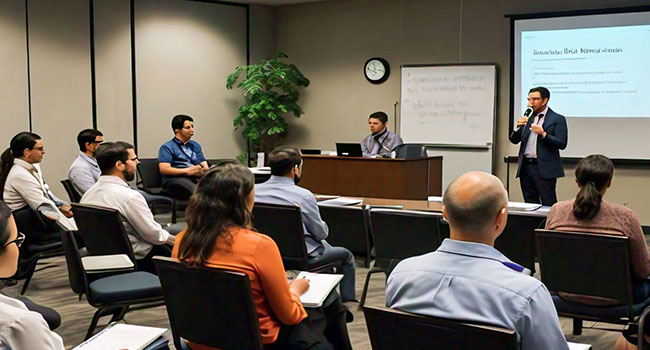Mediation Training Program

| Date: | 16 to 20 December, 2024 |
|---|---|
| Time: | 9:00am - 5:00pm |
| Venue: | City Campus, IBA Karachi |
| Investment: | PKR 300,000 + 5% SST/ per head |
| Contact: | ceeinfo@iba.edu.pk (0213) 8104700 (Ext:1809, 1812, 1808) |
| Registration Deadline: | 5 days prior to the workshop date |
This 5-day Domestic Mediation Workshop is designed to equip participants with the foundational skills and knowledge to mediate disputes effectively. It provides a structured approach to mediation, introducing participants to the principles, techniques, and ethics involved. Through interactive learning, including role-plays and assessments, participants will gain practical experience in resolving disputes in a controlled, professional setting. The workshop aligns with recognized mediation frameworks, focusing on domestic dispute resolution.
Key Features
- Duration: 5 Days (40 hours)
- Format: Interactive workshops, role-plays, case studies, group discussions
- Assessments: Written and role-play evaluations
- Target Audience: Professionals from all backgrounds, HR and Legal practitioners, and individuals interested in mediation
By the end of the 5-day workshop, participants will be able to:
- Understand Mediation Frameworks:
- Grasp the principles, processes, and legal aspects of mediation.
- Recognize the differences between mediation and other forms of dispute resolution.
- Develop Key Mediation Skills:
- Exhibit active listening, effective communication, and negotiation techniques.
- Build rapport with disputing parties, manage emotions, and facilitate constructive dialogue.
- Apply Problem-Solving Strategies:
- Employ interest-based negotiation strategies to find mutually beneficial solutions.
- Use creative problem-solving techniques to break deadlocks and manage complex disputes.
- Handle Ethical Challenges:
- Apply ethical principles of neutrality, confidentiality, and impartiality.
- Navigate power imbalances and cultural sensitivities in domestic disputes.
- Practical Mediation Experience:
- Demonstrate mediation skills in simulated role-play sessions.
- Gain feedback on mediation performance, identifying areas for improvement.
Day 1: Introduction to Mediation and Conflict Resolution
- Understanding Mediation: Definitions, types, and process
- Conflict Resolution Basics: Sources, types of conflicts, and conflict management styles
- Mediation vs. Other ADR Methods: Arbitration, Negotiation, Litigation
- Stages of Mediation: Preparation, opening, exploration, bargaining, agreement
- Mediation Role Play: Participants act as mediators and parties in simulated mediation sessions
Day 2: Mediation Process and Skills
- The Role of a Mediator: Impartiality, neutrality, managing emotions
- Communication Skills: Active listening, questioning, reframing, summarizing
- Building Rapport: Establishing trust and empathy between disputing parties
- Ethics and Confidentiality: Principles guiding mediators’ conduct
- Mediation Role Play: Participants act as mediators and parties in simulated mediation sessions
Day 3: Negotiation and Problem-Solving in Mediation
- Interest-Based Negotiation: Moving beyond positions to uncover interests
- Problem-Solving Techniques: Generating options, BATNA (Best Alternative to a Negotiated Agreement)
- Dealing with Impasse: Strategies for managing deadlocks and resistance
- Mediation Case Study: Group exercise focusing on domestic disputes
- Mediation Role Play: Participants act as mediators and parties in simulated mediation sessions
Day 4: Role Play and Real-World Application
- Mediation Role Play: Participants act as mediators and parties in simulated mediation sessions
- Power Imbalances: Recognizing and addressing power dynamics in mediation
- Cultural and Emotional Intelligence: Understanding the role of cultural and emotional factors in mediation
- Mediation Case Study: More complex case scenarios
Day 5: Feedback and Practical Application
- Advanced Role Play Practice Sessions: Participants conduct full mediation sessions observed by trainers
- Feedback Session: Detailed feedback on mediation performance, communication, and process management
- Review and Recap: Key learnings, challenges, and future practice areas
Role-Play Sessions
Throughout the workshop, participants will engage in structured role-play sessions where they take turns acting as mediators and disputing parties. These sessions are designed to:
- Provide hands-on experience in managing real-world disputes.
- Allow participants to practice mediation skills in a safe environment.
- Facilitate constructive feedback from trainers and peers.
Role Play Topics
- Family disputes (e.g., inheritance issues, custody agreements)
- Workplace conflicts (e.g., employee grievances, managerial disputes)
- Community-based disputes (e.g., neighbor disagreements, property issues)
PKR 300,000/- per head
Includes Training and Assessments
Doesnot include annual memberships and any applicable taxes
Workshop delivery approach
A highly interactive and practical content delivery format will be used. Blended approach with emphasis on ‘experiential’ learning will be utilized to create a solid base for knowledge sharing. Effective attention generation and total engagement tools will facilitate real time learning. No prior workshop preparation will be required. All the materials will be provided during the workshop. However, some evening work may be a part of the workshop!
Duration of the workshop
Two days
- Written Assessment:
- Covers key theoretical concepts of mediation, ethical issues, conflict management styles, and case studies.
- Participants will answer multiple-choice questions, short answers, and scenario-based questions.
- Role-Play Assessment:
- Participants will undergo a formal evaluation based on a final mediation role-play session.
- The role-play assessment will be observed by trainers, with feedback provided on performance.
IBA CEE Cancellation Policy for Open Enrollment Programs:
In the event of participant's cancellation, the following schedule will apply:
- 5 days before start of workshop - No cancellation
- Within 4 to 2 days prior to workshop Half program fee forfeiture
- Within 1 day and No Shows - Full program fee forfeiture
Cancellation notification must be made in writing to CEE.
Postponement
Due to any unavoidable circumstances, the workshop may be postponed by the institute. In case of postponement, the institute will refund full fee of the program or the participant may opt to defer his/her registration to the next program.
Substitute
Substitutes will be taken at least 2 days prior to the workshop. Should we be unable to accept your application for any reason, your payment (cheque/draft) will be returned to you.
Deferrals
All registrations deferrals must be requested in writing at least 2 days prior to the workshop. Send a note to the Program Registration Team indicating that you wish to have your registration deferred to another session of the same program within one year. The deposited fee will be carried forward. Please note that only one transfer is permitted. After one year, the deposited fee will be fully forfeited.
"It was a wonderful experience of my life. I will thank IBA for this great training session as per SPPRA. All the trainers were very much confident and highly experienced."

Upcoming Workshops





